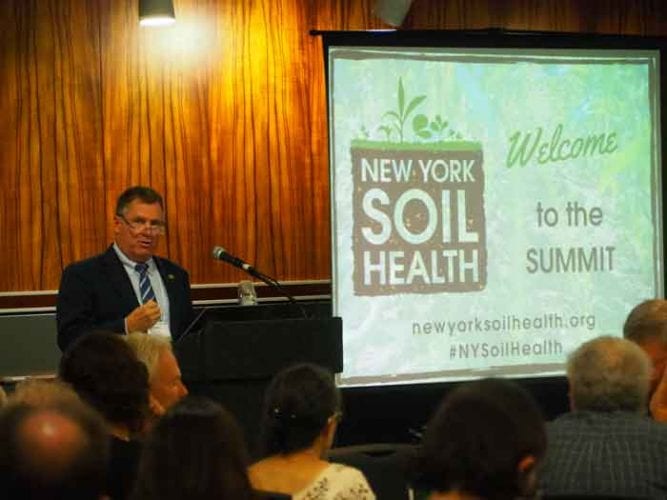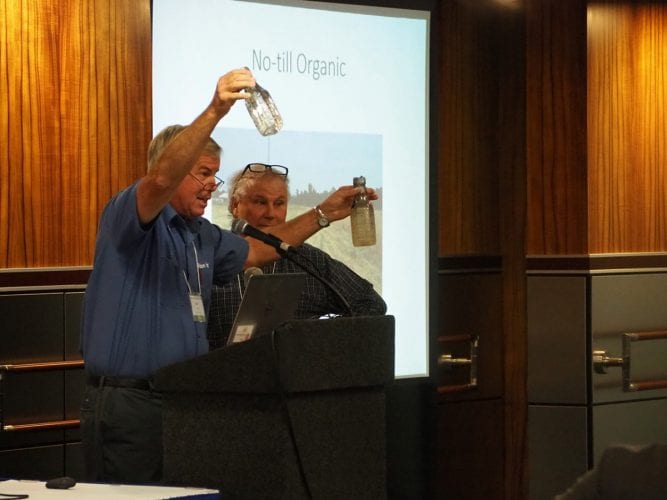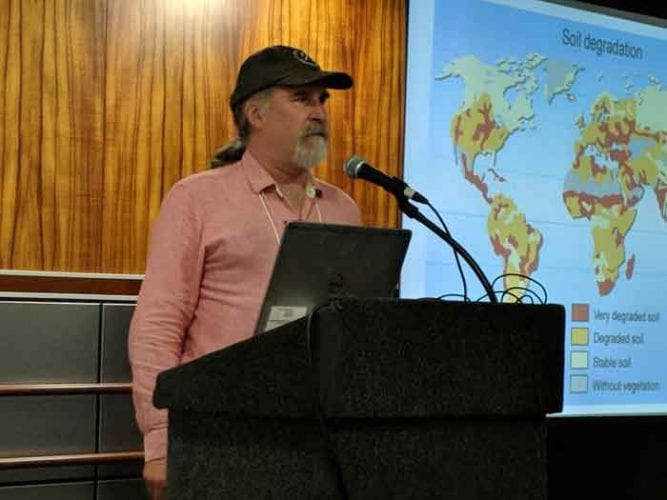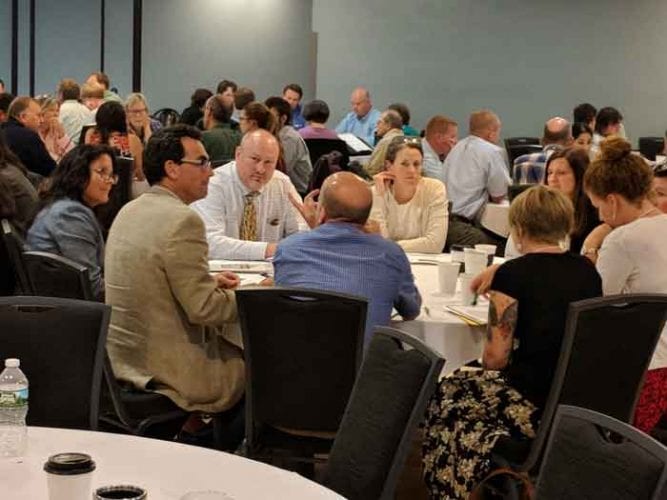By Kitty Gifford
Note: A version of this was published in the Cornell Chronicle.

Patrick Hooker, New York deputy secretary for food and agriculture, delivered the morning remarks at the summit.
New York government policy and nonprofit leaders, researchers, farmers and agricultural professionals from 40 organizations attended the first statewide Soil Health Summit July 18 in Albany, New York.
“The setting of this soil summit next to the state capital was by intention,” said David Wolfe, Cornell professor of plant and soil ecology and program lead for New York Soil Health. He said New York has been at the forefront of the global soil health movement and summit participants would discuss where to go from here.
“We were pleased to have representatives from Gov. Cuomo’s administration and agency partners as well as representatives from the state Senate and Assembly in attendance,” said Wolfe. “The summit goals were to expand collaboration among the many farmers and organizations working on soil health issues, and also to identify research, outreach and policy priorities for the future.”
Topics included economic analyses of soil health costs and benefits; the relationship between soil health and climate change; addressing challenges of reducing tillage on vegetable farms; soil health for apple orchard systems; fortifying biochar with manure wastes as marketable fertilizer; and research on cover crop interseeding and perennial grains.
Farmer Donn Branton of Genesee County illustrated the connection between water quality and soil health by showing two samples of water, one cloudy with sediment from the creek entering his property and the other with clear water that exits his farm. “We all need to work together and do our part, and soil health practices like cover crops and reduced tillage can improve the environment around us,” he said.

Donn Branton of Branton Farms illustrates the connection between water quality and soil health by showing two samples of water, one cloudy with sediment from the creek entering his property and the other with clear water that exits his farm.
Growers provided examples of the benefits they have seen from reducing tillage and using cover crops, including reduced erosion, better resilience to drought and flooding, and increased yields. They also talked about experimentation on the farm to address challenges to adopting soil health practices. New York growers often collaborate with Cornell researchers in exploring innovative soil health practices, and also benefit from information provided by Cornell Cooperative Extension programs.
“We could use some good news stories in the environment these days, and I think the idea of rebuilding soil health really is one we can build an alliance around,” said keynote speaker David Montgomery, professor of earth and space sciences at the University of Washington.

Keynote luncheon speaker, David Montgomery from the University of Washington spoke to the audience about his recent book, which closely matched the theme of the event: Growing a Revolution: Bringing our Soils Back to Life.
Representatives from The Nature Conservancy, Northeast Organic Farming Association, New York Farm Viability Institute, American Farmland Trust and New York Farm Bureau discussed the intersection of their work with soil health.
“We are really excited to be a part of this dialogue, and we are learning from all of you how food, water and climate comes together in our soils,” said Rebecca Benner, New York State science director for The Nature Conservancy in her remarks on the links between soil, water, and nutrient management.
American Farmland Trust pointed out the value of looking at other states, such as California, for policy strategies relevant to soil health. The New York Farm Viability Institute pointed out the emphasis of their grant program on soil health projects. Finally the New York Farm Bureau shared strategies for communication with state policy-makers.
“Cornell CALS is very pleased to kick off what we hope will be a robust and lasting partnership between farm and environmental NGOs and New York and federal agency personnel engaged in soil health, to better serve the needs of the farm community in New York and meet our environmental policy goals,” said Julie Suarez, CALS associate dean for government and community relations.

The wide range of stakeholders at the Summit had their voices heard when they broke into small groups to identify soil health priorities for research, outreach, and policy.
The New York Soil Health project, established in 2017, facilitates collaboration among soil health efforts across the state to implement research, outreach and policy solutions to address constraints to improved soil health practices. New York Soil Health is funded by the state’s Environmental Protection Fund and coordinated by Cornell University’s College of Agriculture and Life Sciences (CALS).
View our Current Priorities and Plans for 2018-2019.
A special note:
New York Soil Health is especially grateful for the lunch prepared by Chef Matt Joyce of Mazzone Hospitality. Joyce sourced the lunch ingredients from nineteen local farms to create a deliciously creative and seasonal meal.


